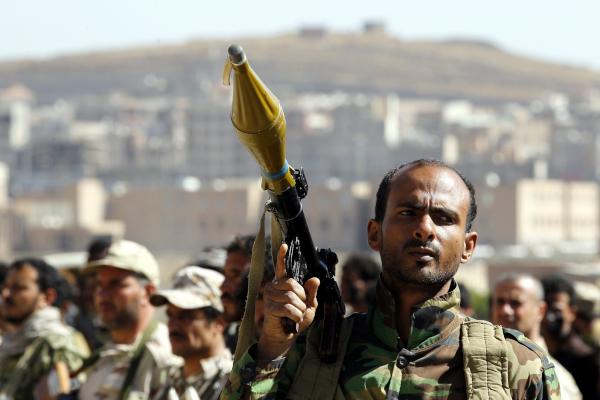Supported by the Saudi-led Arab coalition, the Yemeni army has surprised everyone by entering and expanding in Saada which is considered to be under Houthi control.
This is a very important development and even the Vice President of Yemen Ali Mohsen Saleh Al-Ahmar flew there, and this confirms the importance of the battle and its symbolic value. A year and a half ago, the rebels believed that General Ali Mohsen Saleh Al-Ahmar would not return to Yemen after he left it and that this signalled the end of the republic.
However, there were many important and simultaneous military developments on the ground in Yemen, and Yemeni legitimate forces and coalition forces have achieved victories on many fronts.
Mokha, in the west of the country, was liberated with support from the air and the sea and this allowed it regain control of Bab Al-Mandab. This is according to recent reports that also mentioned the significant progress made in Taiz where fighting continues in every single street in the city, and in Al-Bayda also. The Yemeni army has also gained control of most of the east coast which was a gateway to smuggle weapons from Iran to the rebels.
It is difficult for the rebels to penetrate the naval blockade after the intensification of the naval forces’ activities that resist ships and boats smuggling weapons. These simultaneous victories are politically important and will encourage large countries that are reluctant to stand with the legitimate government. Yemen will be a test for the policies of the new US President Donald Trump’s administration in confronting Iran.
Politically, we are witnessing quick actions, and the UN envoy returned to propose a long-term truce and negotiate a peaceful solution. The rebels, the Houthi militias and those loyal to President Ali Saleh, want to manoeuvre and are therefore delaying the acceptance of an international peace initiative. The Houthis insist on transferring all of the President’s power to his deputy. This will weaken the initiative and disrupt it and will make them lose their chance to participate in government.
Their intransigent attitude is most probably influenced by Iran’s stance which plays a primary role in igniting the war and supporting all the military, diplomatic and propaganda related activities of the rebels. The Iranians insist on participating in the negotiations in order to sell their allies in Yemen within the regional barter basket.
Due to the fact that the legitimate government has recovered nearly eighty per cent of Yemen, the rebels’ options have become limited and they have a short period of time to take advantage of a peaceful solution to end the war through reconciliation and political partnership. This opportunity will no longer be available once military takeover becomes imminent!
The losses suffered by the militias have affected their internal relations, and most of their forces that are located in the capital Sana’a now differ regarding how to manage their government, and this includes the slogan that the Houthis borrowed from Iranian militias “Death to America, death to Israel”. The group loyal to the ousted President Saleh is using another slogan that is just as hypocritical after they ripped the country apart; “One Yemen and one people”.
Sana’a will be the last battle, and I do not say that it will be the decisive one because the rebels’ draft project has definitely failed as they have lost most of Yemen, have failed to manage the alternative government and failed to move the central bank to Aden, which has become the capital since Hadi’s government moved there after returning from exile in Saudi Arabia.
Recent military gains are leading to significant breakthroughs in the war in Yemen that has been going on for more than a year and a half, and this is a shorter period than the duration of other wars in the region. The wars in Syria and Libya have been going on for five years, and the war in Afghanistan has been going on for 15. Yemeni people have suffered greatly as a result of the coup, the destruction of the political system and the legitimate authority, and the rebels’ seizure of the state’s resources and the entire country.
